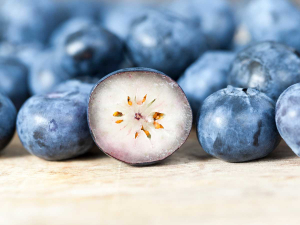Dairy and veg prices fall at Foodstuffs stores
Shoppers paid less at the checkout for cheese, butter and ice cream at Foodstuff stores in December and many vegetables were down more than 30%.
 Blueberries are likely to have a bumper season as the warmer El Niño weather pattern arrives in New Zealand ahead of peak blueberry season in mid-January.
Blueberries are likely to have a bumper season as the warmer El Niño weather pattern arrives in New Zealand ahead of peak blueberry season in mid-January.
Blueberries are likely to have a bumper season as the warmer El Niño weather pattern arrives in New Zealand ahead of peak blueberry season in mid-January.
Foodstuffs South Island head of produce Justin Dykhoff says blueberry supply for the upcoming season is looking very good which is good news for customers.
“Kiwis are big blueberry eaters and they are often among the top selling produce items in the lead up to Christmas,” says Dykhoff.
According to the latest annual publication by United Fresh, Fresh Facts 2023, New Zealand produces more than 3,000 tonnes of blueberries each year.
While strawberries still reign supreme, with around 1.4 million punnets sold across Foodstuffs South Island stores in 2022, blueberries come in as the second most popular berry Kiwis reach for, followed by raspberries at 203,000 and blackberries at 16,000.
“Our South Island stores sold just under 1 million punnets of blueberries last season and we’re expecting them to do well again this year as popularity increases and more supply is available,” Dykhoff says.
Comparatively, Foodstuffs North Island stores sold 3,750,000 punnets in the past 12 months.
The wet weather experienced at the beginning of the year has had an impact on strawberry supply, with higher-than-average rain impacting the fruit as it entered the propagation stage. This means that strawberries won’t be as plentiful this season however supply is expected to return to normal next season.
“Kiwis will still be able enjoy strawberries in their champagne during the festive season, so there’s no need for too much concern,” Dykhoff says.
“We just may not see that glut of fruit at peak season like we're used to seeing, so it's good to be aware of that as we approach summer,” he adds.
The pick of the pack this season is the hardy blueberry which has weathered the elements and come out the other side.
With good levels of blueberry supply across the country, Kiwis will be able to get great value at the checkout. Part of the reason for the good blueberry supply is down to state-of-the-art technology and growing techniques.
Dykhoff recently travelled from the South Island to look at how the crop is coming along at Blueberry Country in Ohaupo.
The Waikato-based blueberry growers are a major supplier to Foodstuffs South Island and Foodstuffs North Island.
Blueberry Country has three orchards in the upper North Island and one in Southland, with approximately 750,000 plants across all locations producing more than 1,000 tonnes of blueberries annually.
Kelvin Bezuidenhout, general manager at Blueberry Country, says this is one of the most exciting parts of the year for the company.
“The berries are changing from green to blue and this means we’re close to the season starting,” he says.
“We’ve been growing blueberries for more than 40 years and are always working to achieve the very best tasting berries. Our entire crop here covers 176 hectares and is all grown outdoors.
“This year has been exceptionally challenging for produce growers across Aotearoa. We’re very fortunate to have a delicious crop that will be ready for picking in mid-November, because it just wouldn’t be a Kiwi summer without blueberries,” Bezuidenhout says.
“It’s shaping up to be a great season for blueberries this year,” says Dykhoff.
“I’m really happy with how they’re coming along.”
Blueberries are currently at the fruiting stage and are expected to be ready to pick in mid-November, and plentiful in mid-January, at the peak of the season, which means we can expect prices for one of our favourite berries to continue getting better and better this summer.
Global trade has been thrown into another bout of uncertainty following the overnight ruling by US Supreme Court, striking down President Donald Trump's decision to impose additional tariffs on trading partners.
Controls on the movement of fruit and vegetables in the Auckland suburb of Mt Roskill have been lifted.
Fonterra farmer shareholders and unit holders are in line for another payment in April.
Farmers are being encouraged to take a closer look at the refrigerants running inside their on-farm systems, as international and domestic pressure continues to build on high global warming potential (GWP) 400-series refrigerants.
As expected, Fonterra has lifted its 2025-26 forecast farmgate milk price mid-point to $9.50/kgMS.
Bovonic says a return on investment study has found its automated mastitis detection technology, QuadSense, is delivering financial, labour, and animal-health benefits on New Zealand dairy farms worth an estimated $29,547 per season.

OPINION: Here w go: the election date is set for November 7 and the politicians are out of the gate…
OPINION: ECan data was released a few days ago showing Canterbury farmers have made “giant strides on environmental performance”.